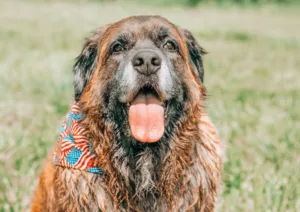⭐
Google Rating
4.9 Stars · 320+ Reviews
🐕
Dogs Trained
2,000+ Transformations
🎖️
Training Method
MARSOC Military Methods
♾️
Guarantee
Lifetime Support Included
Fireworks might be a symbol of celebration for us, but for dogs, they can be a terrifying experience. As the Fourth of July approaches, many pet owners in Nashville are preparing for BBQs, parades, and the inevitable bursts of light and sound in the night sky. Unfortunately, this holiday is also a peak time for runaway pets due to noise-related anxiety.
So how can you ensure your dog feels safe and secure through the chaos? This guide will help you understand what causes firework anxiety and how to reduce your pup’s stress through practical steps and professional training.


Why Fireworks Trigger Fear in Dogs
Dogs have more sensitive hearing than humans, which makes the loud, unpredictable booms of fireworks particularly distressing. Unlike thunderstorms, fireworks don’t come with the natural cues dogs can learn to predict, like changes in air pressure or wind. They’re random, and that randomness is scary. Common symptoms of firework-related anxiety include:- Pacing or restlessness
- Excessive drooling
- Hiding under furniture
- Whining or barking
- Destructive behavior
- Attempting to escape
How to Prepare Your Dog in Advance
Preventing anxiety starts with preparation. Here are a few steps to take before the fireworks begin:Checklist for Calming Prep:
- Create a safe, secure “den” where your dog can retreat
- Use calming music or white noise to drown out external sounds
- Try a compression vest for added comfort
- Keep your dog indoors well before dark
- Microchip and ID tags should be up to date, just in case
How Obedience Training Helps During High-Stress Events
Professional dog training isn’t just about teaching sit and stay. It plays a huge role in helping dogs handle stressful environments, especially ones filled with noise and unpredictability. With our Basic Obedience Training for Anxious Dogs, we reinforce calm behaviors through structured routines, confidence building, and clear communication. Dogs learn to look to their owners for direction instead of reacting fearfully. Even older dogs can benefit from this type of focused training. As explained in our post on training older dogs, senior pups often adapt well when training is tailored to their maturity and temperament.Natural and Vet-Recommended Calming Aids
Some dogs may need additional help on the big night. Talk to your vet about anxiety-reducing supplements or medications that are safe and effective for your dog’s size and age. There are also natural options available such as:- CBD treats formulated for pets
- Pheromone diffusers (like Adaptil)
- Chamomile or valerian root-based chews
Long-Term Solutions for Year-Round Peace
While Fourth of July is a major trigger, many dogs also struggle with thunderstorms, construction noise, and even vacuum cleaners. Building confidence and desensitizing your dog to loud noises through proper training can be a life-changer. Our Noise Desensitization and Obedience Programs are designed specifically for this. We tailor each session to your dog’s temperament, using proven strategies to reduce fear and encourage focus, even in high-stress situations. Explore our full range of training options, including Basic Obedience Training for Anxious Dogs, at our Nashville dog training programs.Fourth of July Game Plan: Your To-Do List
Before the 4th:
- Schedule a training assessment
- Prep your calming space and noise distractions
- Test calming aids or vet-prescribed options
Day of the 4th:
- Exercise your dog early to reduce restlessness
- Feed them before fireworks start (anxious dogs may not eat later)
- Keep them leashed or confined in a secure room
- Stay calm, your dog looks to you for cues
Celebrate Calmly This Independence Day
Fireworks don’t have to send your dog into a panic. With the right approach and support, you can help your pup face the Fourth of July with more confidence and far less fear. If your dog struggles with loud noises or anxiety in general, now is the perfect time to start a customized training program. Reach out to our team to schedule your consultation and give your dog the tools they need to stay calm year-round. Contact us today to get started!
📍 Service Areas
```
Nashville Dog Training — Serving All of Middle Tennessee
Professional off-leash dog training across Nashville, Murfreesboro, and 20+ communities in the Greater Nashville area. Click your city for local training information.
```
Brentwood
Dog Training Brentwood TN
Franklin
Dog Training Franklin TN
Gallatin
Dog Training Gallatin TN
Hendersonville
Dog Training Hendersonville TN
Ashland City
Dog Training Ashland City TN
Cumberland City
Dog Training Cumberland City TN
Adams
Dog Training Adams TN
Elkton
Dog Training Elkton TN
East Nashville
Dog Training East Nashville
Green Hills
Dog Training Green Hills Nashville
Germantown
Dog Training Germantown Nashville
The Gulch
Dog Training The Gulch Nashville
Antioch
Dog Training Antioch TN
Spring Hill
Dog Training Spring Hill TN
Mount Juliet
Dog Training Mount Juliet TN
Coopertown
Dog Training Coopertown TN
Greenbrier
Dog Training Greenbrier TN
Springfield
Dog Training Springfield TN
Indian Mound
Dog Training Indian Mound TN
Palmyra
Dog Training Palmyra TN
🎖️ Training Programs
Nashville Dog Training Programs
From puppy basics to advanced off-leash obedience — find the right training program for your dog. 0% APR financing available.
Most Popular
🏠
Board & Train Nashville
Your dog stays with our trainers for 1-2 weeks and comes home fully trained with off-leash obedience. Nashville's most popular program.
Starting at $1,875
View Board & Train Details →
Specialist
🛡️
Aggressive Dog Training Nashville
Expert rehabilitation for dogs with aggression, fear, or reactivity issues. Military-grade behavioral modification techniques.
Custom Programs
View Aggression Program →
Foundation
🐶
Puppy Training Nashville
Set your puppy up for lifelong success with foundational obedience, socialization, and potty training from Nashville's top puppy trainers.
Lesson Packages Available
View Puppy Programs →
Advanced
🏃
Off Leash Dog Training Nashville
100% off-leash obedience at parks, restaurants, and downtown Broadway. The same level of control as military working dogs.
See Pricing Options
View Off Leash Details →
Essentials
🎓
Basic Obedience Training Nashville
Master the essentials: sit, down, stay, come, heel, and place command. Private lessons tailored to your dog's specific needs.
Starting at $600
View Obedience Packages →
Certification
💛
Therapy Dog Training Nashville
Prepare your dog for therapy dog certification. We are certified Therapy Pets Unlimited evaluators serving Nashville hospitals and schools.
Certification Prep Program
View Therapy Dog Program →
🎸 Music City's Top Dog Trainers
Ready to Transform Your Dog in Nashville?
From Broadway to Brentwood — Nashville's highest-rated trainers are ready to help. Free consultation, 0% financing, and lifetime support included.
